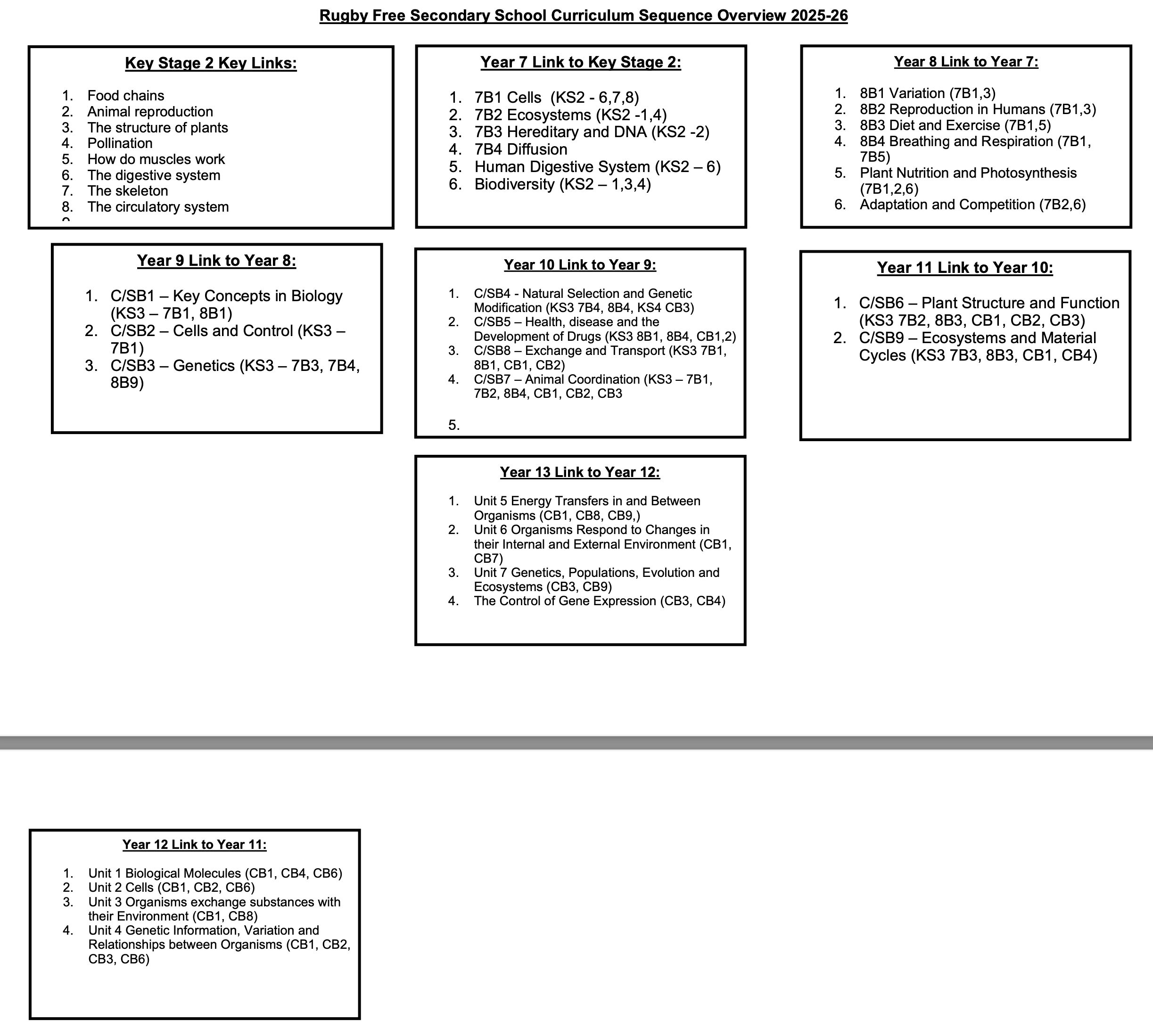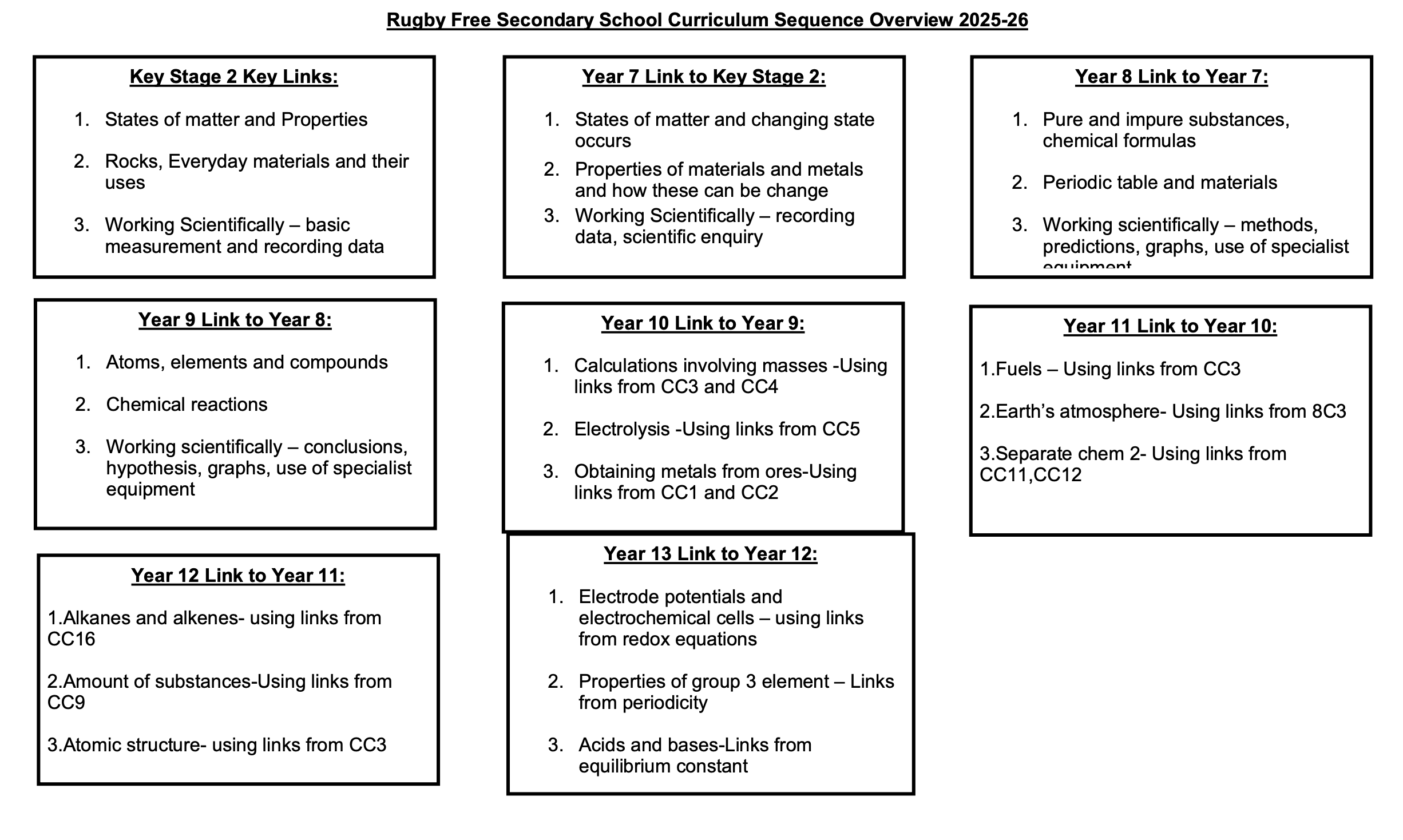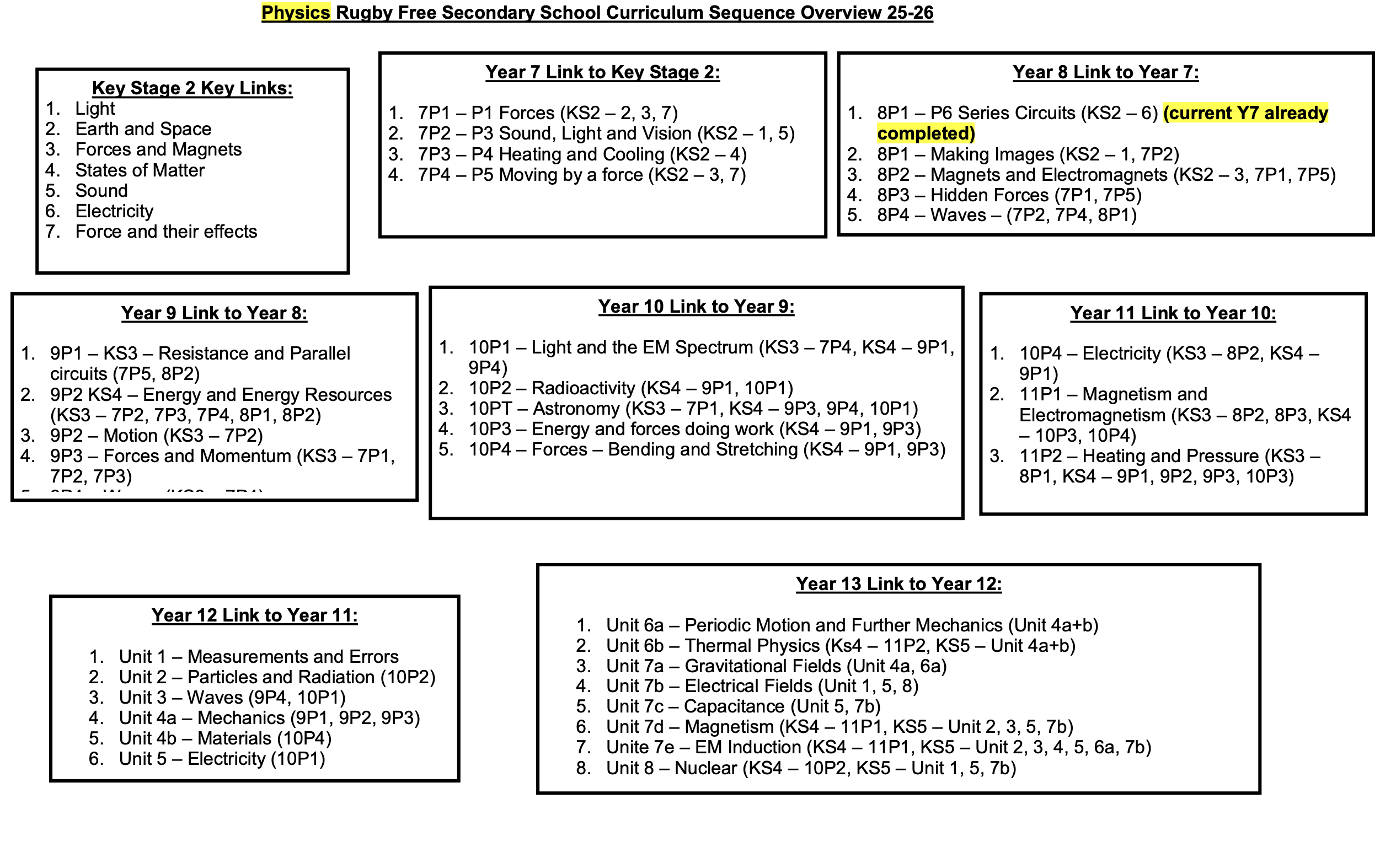Science Department – Overarching Curriculum Intent (September 2025)
RFSS Curriculum Vision Statement:
To build an inclusive curriculum which is aspirational for all and empowers our students to make outstanding academic and personal progress.
Science Curriculum in Context:
We are a proud member of the Triumph Learning Trust (TLT), which encompasses Rugby Free Secondary
School, Rugby Free Primary School, Courthouse Green Primary School, Cawston Primary School, and
Alderman’s Green Primary School. The local context of Rugby heavily influences our curriculum intent and
implementation, with contextual factors signifying that students need to be equipped with key knowledge and
skills due to the higher-than-national-average cost of living in the area. Here at RFSS, our curriculum offer is
driven by the diverse and multicultural nature of our student body, which is something we are proud of, and
actively celebrate.
The ongoing development of Science education continues to face challenges, particularly in fostering students’ disciplinary knowledge and practical skills. The opportunity for students to engage in hands-on practical work and for staff to effectively model and demonstrate investigations has been limited, which affects students’ ability to develop the necessary scientific inquiry skills. While the impact on substantive knowledge has been less significant, there has been a noticeable effect on students’ literacy and numeracy, which are essential for supporting their understanding of Science concepts.
Aspiration and ambition are core principles of our curriculum, and we are committed to ensuring that all students, including those from disadvantaged backgrounds, have the opportunity to thrive. At least sixty percent of our cohort experiences some form of deprivation, with over a third of our students living in areas with above-average crime rates. As a result, we work tirelessly to support a wide range of sub-groups—whether that be SEND, EAL, disadvantaged students, or High Prior Attaining learners—ensuring that our curriculum adaptations allow all students to flourish in a holistic environment.
In Science, we believe that it is crucial for students to develop not only technical knowledge but also the literacy skills necessary to articulate their understanding. Disciplinary literacy (reading, writing, and oracy) is central to our approach, enabling students to engage deeply with scientific content, ask questions, and communicate their findings effectively. By embedding these literacy skills, we aim to empower students to navigate the world with a clear understanding of how Science and technology intersect and shape their futures.
In an increasingly technological world, understanding how things work is vital for students, as this foundational knowledge will be key to their future careers in industries where Science and technology will play central roles. To support this vision, we have crafted our curriculum not just to engage students with relevant scientific content but to link this knowledge to real-life contexts and applications. Through this, we aim to inspire students and equip them with the skills needed to excel, both academically and in the world beyond school. Our warm-strict approach helps nurture students in a supportive yet challenging environment, making our Science curriculum an integral part of their overall growth and success.
Curriculum Aims:
Our curriculum aims to:
- Develop of an inclusive, diverse, and immersive environment focusing on a 360-student experience where academia, creativity, talent, and aspiration is combined with the building of resourceful, resilient problem solvers, fully equipped as outstanding learners to become outstanding world citizens and young adults.
- Inspire scientific curiosity and confidence by building on the ideas that pupils bring to lessons and have previously learnt in primary science.
- Prioritise and develop scientific disciplinary and substantive vocabulary and support pupils’ ability to read complex academic texts and write confidently about science.
- Provide opportunities for structured talk to improve student’s oral communication and responses in order to effectively present solutions and grow their problem-solving skills, as well as accurately analyse and draw conclusions from a wide range of subject matter.
- Create self-regulated independent learners who are able to apply and link key scientific knowledge and principles across a broad spectrum of contexts and subjects they study.
- Develop students’ knowledge of working scientifically over time through revisiting disciplinary knowledge throughout each key stage with extensive practical work and or demonstrations; with a focus on specific skills at each opportunity linking to working scientifically and the ‘SET for Life’ principles of RFSS.
Our broad and balanced curriculum concentrates on developing our students’ key knowledge and skills and enhances their understanding of the world around them.
We do this by:
- Stimulating intellectual curiosity and independence by shaping content to engage with the world around pupils using real life contexts and examples.
- Ensuring that enough time is built into the curriculum for pupils to learn and remember key knowledge and regularly connect new learning to what pupils have already learnt and promoting challenge for all, irrespective of starting points.
- Having suitable curriculum time allocated to science so that all content from the KS3 curriculum is taught in Y7, Y8 and the Autumn term of Y9, which builds on their substantive and disciplinary knowledge from KS2. This is then linked through to KS4 and KS5 to ensure the full breadth of the national curriculum is accessible.
- Stretch students by introducing disciplinary and substantive vocabulary early in their learning journey to ensure mastery at higher levels and avoid misconceptions e.g. accuracy and precision.
- Using models to support understanding but also discussing the limitations of models in order to ensure no misconceptions are brought forward into new learning.
- Ensure pupils have enough opportunities to take part in high quality practical work that has a clear purpose in relation to the curriculum and identifies and sequences the disciplinary knowledge that pupils need to work scientifically.
- Enriching pupils learning through extra curricula clubs and trips to support, encourage and promote STEM careers.
Our curriculum is focused on the development of communication, character and cultural capital of each individual student, so they become:
- Resilient, well-rounded and hardworking citizens equipped with analytical and problem-solving transferable skills they are able to take forward with them into their chosen careers.
- Articulate individuals who can verbalise their own thoughts, ideas, emotions and knowledge and confidently ask questions, explore and challenge ideas about the world around them.
- Open minded, morally balanced young people who are empathetic to all cultures and beliefs and promote diversity and equity in their everyday lives and encompass and champion British values.
Curriculum Outcome:
At the heart of our Science curriculum is a passion to ignite curiosity and scientific thinking, so students leave RFSS with an understanding of how the world works around them. It aims to empower them with transferable skills in writing, communication, problem solving, analysis and research strategies to ensure they are equipped for their futures as industrious and productive members of our society who are confident to challenge the world around them and impact positive change upon it.



